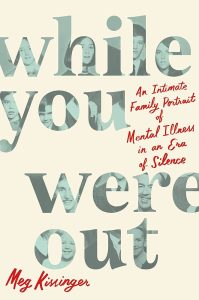 From award-winning journalist Meg Kissinger, a searing memoir of a family besieged by mental illness, as well as an incisive exploration of the systems that failed them and a testament to the love that sustained them.
From award-winning journalist Meg Kissinger, a searing memoir of a family besieged by mental illness, as well as an incisive exploration of the systems that failed them and a testament to the love that sustained them.
Growing up in the 1960s in the suburbs of Chicago, Meg Kissinger’s family seemed to live a charmed life. With eight kids and two loving parents, the Kissingers radiated a warm, boisterous energy. Whether they were spending summer days on the shores of Lake Michigan, barreling down the ski slopes, or navigating the trials of their Catholic school, the Kissingers always knew how to live large and play hard.
But behind closed doors, a harsher reality was unfolding—a heavily medicated mother hospitalized for anxiety and depression, a manic father prone to violence, and children in the throes of bipolar disorder and depression, two of whom would take their own lives. Through it all, the Kissingers faced the world with their signature dark humor and the unspoken family rule: never talk about it.
While You Were Out begins as the personal story of one family’s struggles then opens outward, as Kissinger details how childhood tragedy catalyzed a journalism career focused on exposing our country’s flawed mental health care. Combining the intimacy of memoir with the rigor of investigative reporting, the book explores the consequences of shame, the havoc of botched public policy, and the hope offered by new treatment strategies.
Powerful, candid and filled with surprising humor, this is the story of one family’s love and resilience in face of great loss.
Genre: Memoir
Publication Date: September 5, 2023
Awards: Nominee for Readers’ Favorite Memoir & Autobiography (2023)
My Review:
I first saw this author present at the Chippewa Valley Book Festival this fall. After hearing her speak, I knew I had to read her memoir. Kissinger is a renowned journalist who has written about mental health before, but this book-length memoir about growing up surrounded by mental illness in an era when people just didn’t talk about that is pivotal in understanding how the mental health issues in this country have grown into an epidemic.
This narrative-driven memoir is in turns distressing, earnest, heart-wrenching, and hopeful. The author is acutely aware of the ways her siblings’ and her parents’ entwined lives bent and twisted each other out of shape—mostly by way of violence and ignorance, common effects of intergenerational trauma. Both her siblings and parents underwent the agony of living with and losing loved ones whose illnesses proved challenging not only to diagnose but also to treat and support within the United States’ inadequate mental healthcare framework. Crucially, she suggests that perhaps most challenging of all are the stigma and shame that accompany individuals and their families dealing with serious mental illness.
This book is a powerful and honest look at mental illness and the damage it does. Everyone should read it and then we should ask ourselves this question. “What can I do to advocate for a better system of health care in this country — one that treats mental illnesses like we treat other diseases?” I give this book 4.5 stars.

